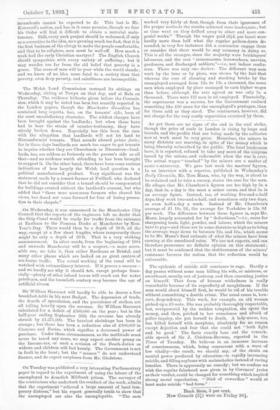As yet there arc no signs of the end in
the coal strike, though the price of coals in London is rising by leaps and bounds, and the profits that are being made by the collieries now at work must be very great. Meantime, the miners is many districts are starving, in spite of the money which is being liberally subscribed by the public. The local tradesmen have, it is reported, refused to take any more of the coupons issued by the unions, and redeemable when the war is over. The actual wages " touched" by the miners are a matter of acute controversy. We gave last week the masters' figures. In. an interview with a reporter, published in Wednesday's Daily Chronicle, Mr. Tom Mann, who, by the way, is about to be ordained and to take a curacy, states the case for the men. He alleges that Mr. Chambers's figures are too high by 2s. a day, that 6s. a day is the most a miner earns, and that 5s. is an average figure. Instead, too, of working five-and-a-half days, they work two-and-a-half, and sometimes only two days, or even half-a-day a week. Instead of Mr. Chambers's average of £1 19s. 2d., the average for Yorkshire is 13s. 9d per week. The difference between these figures is, says Mr. Mann, largely accounted for by " deductions,"—i.e., sums for sharpening tools, light, powder, and labour, which the miners have to pay—and these are in some districts so high as to bring the average wage down to between 12s. and 16s., which seems to be Mr. Mann's final estimate of what the miners have been earning at the unreduced rates, We are not experts, and can therefore pronounce no definite opinion on this statement ; but it must be confessed that the stubbornness of the miners' resistance favours the notion that the reduction would be unbearable.






































 Previous page
Previous page